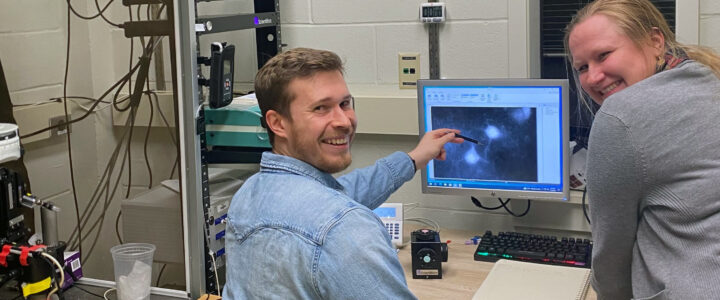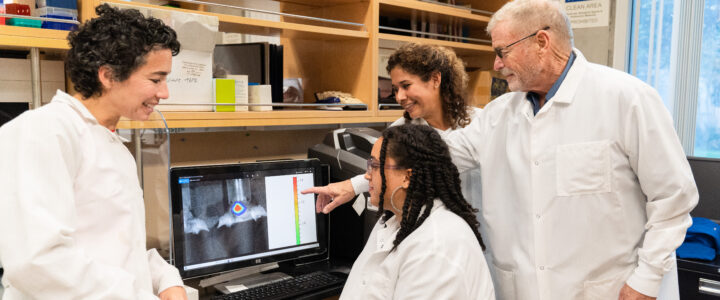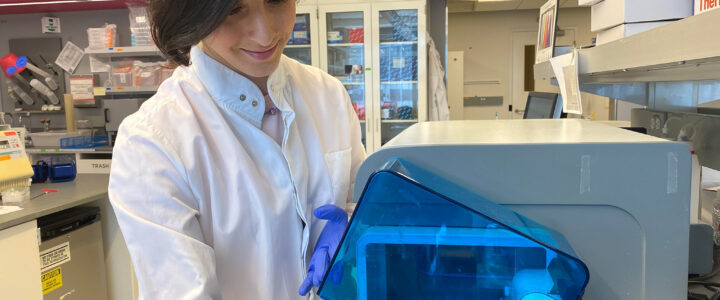Explore Dr. Richter’s encouraging results with ASOs for Fragile X syndrome. A $100,000 grant now fuels pivotal studies needed to advance toward ASO therapy.
Read more
FRAXA Research Foundation Partners with Autism BrainNet
Discover how FRAXA Research Foundation’s collaboration with Autism BrainNet accelerates Fragile X syndrome research by collecting vital postmortem brain tissue. Dive into the significance of brain studies for deeper insights and potential therapeutic interventions.
Read more
ASOs and Fragile X: Addressing the Most Asked Questions
Explore the potential of ASOs in treating Fragile X syndrome & FXTAS. Dive into a comprehensive Q&A addressing key questions and breakthrough findings.
Read more
Slack Potassium Channel Inhibitors to Normalize FMR1 Knockout Mice
Learn how a $100,000 FRAXA research grant supports Yale researchers in using Slack potassium channel inhibitors to treat Fragile X syndrome by normalizing behaviors in FMR1 knockout mice.
Read more
Roles of Postnatal Transient Connectivity in the Development of Fragile X Syndrome
A $100,000 FRAXA research grant awarded to Gabrielle Pouchelon, PhD, and Dimitri Dumontier, PhD, at Cold Spring Harbor Laboratory fuels groundbreaking research on Fragile X syndrome. Their work focuses on understanding sensory sensitivities and developing a noninvasive screening method, a potential game-changer for families affected by Fragile X syndrome.
Read more
A Tat-Conjugate Approach to Treat Fragile X Syndrome
Explore Turner Lab’s novel approach to developing definitive treatment for Fragile X syndrome with a Tat-conjugated, truncated FMRP protein. This innovative strategy aims to restore brain circuit function and reduce abnormal behaviors linked to Fragile X by directly addressing the cause of Fragile X: a missing protein.
Read more
Pioneering Community-Based Drug Development for Fragile X Syndrome
Discover how FRAXA leverages Community-Based Drug Development to create impactful therapies for Fragile X syndrome. Join us as we reshape the future of rare disease treatment.
Read more
The Endocannabinoid System and Fragile X Syndrome
Explore groundbreaking research on the potential of Cannabidiol (CBD) in modulating the endocannabinoid system for Fragile X syndrome therapy. Discover how CBD could change the natural course of Fragile X.
Read more
Innovative Breakthrough in Fragile X Treatment: The Promise of Antisense Oligonucleotide (ASO) Therapy
This changes everything! FRAXA funded research introduces Antisense Oligonucleotide (ASO) Therapy, redefining Fragile X syndrome treatment and understanding.
Read more
Unraveling Fragile X Syndrome: New Insights into FMR1 Gene Reactivation
Discover groundbreaking methods for reactivating the FMR1 gene in Fragile X syndrome. Dive into the transformational research and the implications of self-healing at a cellular level.
Read more
Allos Pharma Advances Phase 3 Clinical Trial Design for Potential Fragile X Syndrome Treatment, Arbaclofen
Discover Allos Pharma’s advancements in a pivotal Phase 3 trial for Fragile X syndrome treatment, Arbaclofen. Learn how their FDA-informed trial design might finally bring hope to the Fragile X community.
Read more
Breakthrough Discoveries in Fragile X Research: Insights from Special Banbury Meeting on Curative Therapies
Explore the latest breakthroughs in Fragile X research unveiled at the recent Banbury Meeting. Discover novel strategies, from gene therapy to protein replacement, that bring hope for curative therapies.
Read more
Modeling Fragile X Syndrome using Multi-Region Human Brain Organoids
Discover groundbreaking research at UCI by Dr. Watanabe and Dr. Tsai. Using cutting-edge organoid technology, they’re modeling Fragile X brain function and advancing potential treatment testing.
Read more
SRC Family Kinase Inhibitor as a Potential Treatment for Fragile X Syndrome
Discover the Smith lab’s new approach to treating Fragile X syndrome using Saracatinib, originally a cancer drug. Learn how this $100,000 FRAXA research grant-funded study opens up hopeful avenues.
Read more
Fragile X Syndrome and Cancer Research: Unexpected Links and Opportunities for Collaboration
Discover unexpected links between Fragile X Syndrome and cancer. Studies show people with Fragile X have much lower cancer rates. Explore new opportunities for collaboration in this promising research.
Read more
Using Exosomes to Discover Fragile X Biomarkers
How can a blood test give an accurate picture of brain activity? With this grant from FRAXA, Dr. Martire and Dr. Boussadia will try to use unique particles called exosomes – which can travel from brain cells to the blood stream – to evaluate the effects treatments are having on the brain.
Read more
FRAXA Investigator Lynne Maquat Awarded 2023 Gruber Genetics Prize
Dr. Maquat, 2023 Gruber Genetics Prize winner, discovered NMD, a key surveillance system in the body that protects against mistakes in gene expression. Her groundbreaking research has led to new therapies for Fragile X syndrome.
Read more
Coming Together for Rare Disease Day 2023
Today, February 28, we mark Rare Disease Day, a day dedicated to raising awareness about rare diseases and highlighting the need for continued research and collaboration. At FRAXA Research Foundation, we are committed to advancing research on Fragile X syndrome, one of the most common rare diseases worldwide.
Read more
Sex-specific Learning Differences Found in Fragile X Patients, Mouse Model
Girls and women with Fragile X syndrome show different learning impairments relative to boys and men with the disease, a finding that was paralleled in a mouse model of the disease, a study found.
Read more
Targeting Cognitive Function in Fragile X Syndrome
It has long been assumed that the differences between males and females with Fragile X were simply a matter of degree, with males being more severely affected. But gender differences may be far reaching. This team is working to understand imbalances in how the brain’s neurons transmit signals, with a focus on how differently males and females learn and experience anxiety. They are studying two neuronal pathways which are promising targets for treatment.
Read more
Validating Novel Inhibitors of ERK Signalling to Treat Fragile X Syndrome
One promising treatment approach for Fragile X syndrome is to inhibit on a neuronal pathway, ERK. ERK inhibitors are also being studied as treatments for other disorders including autism.
This team has conducted pilot studies showing that ERK inhibitors are very effective in reversing signs of disease in Fragile X mice. With this grant from FRAXA they will take the next steps toward possible clinical trials of an ERK inhibitor for individuals who have Fragile X syndrome.

A Look Back at 2022 and Ahead to 2023 Research Prospects
This holiday season you proved that the adage “actions speak louder than words” is entirely accurate. We sincerely appreciate your gifts in action. FRAXA supporters came out in full force to meet the generous $100,000 challenge offered on Giving Tuesday.
Read moreTargeting Serotonin 1a Receptors to Reverse Neurobehavioral Phenotypes
Neurolixis’ new drug targets serotonin 1A receptors, showing promise in preclinical studies for Fragile X syndrome, funded by a FRAXA grant for future clinical trials.
Read more
Meet Ryder!
Meet #FriendofFRAXA Ryder! If you would like to nominate someone as a #FriendofFRAXA, we welcome all who have been touched by Fragile X, including friends, grandparents, siblings, professionals and companions alike to become a #FriendofFRAXA with the goal of putting a face to Fragile X for those who may not know someone directly.
Read more
10 Year Vision for Fragile X Research – Dr. Elizabeth Berry-Kravis & Dr. Patricia Cogram
In this video we hear from FRAXA Investigators Dr. Patricia Cogram, Professor at the University of Chile, and Dr. Elizabeth Berry-Kravis, Professor at Rush University Medical Center as they reflect on the progress that has been made and visualize what they see happening in the next 10 years for people living with Fragile X syndrome.
Read more